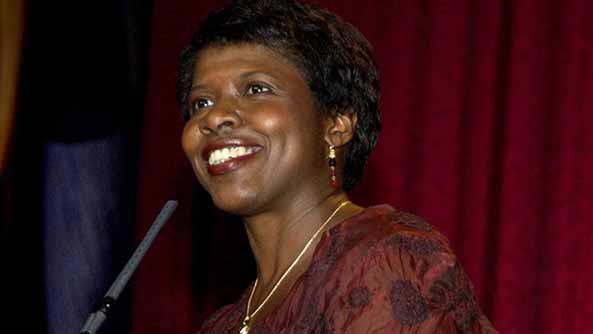The Great Moderator: Gwen Ifill on Witnessing History

Photo: Larry Busacca/WireImage.com
Editor’s note: We were deeply saddened to learn of Gwen Ifill’s passing. In her 2009 interview with O, the Oprah Magazine, she opened up about her career as a trailblazing journalist.
Amid the loud crush of political pundits forever clamoring for our attention, Gwen Ifill has provided an oasis of clear-eyed calm and common sense as a reporter and, for the past decade, as moderator and managing editor of PBS's Washington Week. She made time to chat with O while racing to finish The Breakthrough: Politics and Race in the Age of Obama, her first book, to be published on Inauguration Day.
O: What was your first thought when Barack Obama was elected?
Ifill: I thought of my parents, who didn't live to see the day, and how they would have been transported by the moment. And then I got back to work.
O: What moved you to write The Breakthrough?
Ifill: My theory was that Obama was unique, but he wasn't alone—that there was a treasure trove of black politicians who approach politics differently than their forebears. The hardest part was that things kept changing. I was literally in the middle of writing a chapter about Deval Patrick of Massachusetts, the only black governor in America, when I looked up at my TV to see that Eliot Spitzer had resigned and David Paterson had become the first African-American governor of New York state.
O: How did you respond to the charges that writing this book would affect your objectivity as a PBS reporter and as moderator of the vice presidential debate?
Ifill: They ignored that I've been a reporter for 30 years, that I did a debate in 2004 and no one complained. People seized on the book as a way to discredit me, but I don't think it worked; people with any knowledge of my career rejected it out of hand.
O: What made you decide to become a political journalist?
Ifill: My family was very engaged in the world around us. My father was an African Methodist Episcopal minister and an immigrant from Panama. He was deeply involved in civil rights causes, which scared my mother—she was also an immigrant, from Barbados, who had her hands full with six kids, and she worried that my father would get deported. But because of his passion for politics and civil rights, we paid close attention to current events. We would watch political conventions together—for fun!
I knew early on that I wanted to be a reporter, but I didn't know I was a political journalist until my first job in Boston, in the '70s, covering the public school committee at a time when busing was a huge issue. Children's lives were being directly affected by political decisions, and that's when I realized that everything is politics.
Amid the loud crush of political pundits forever clamoring for our attention, Gwen Ifill has provided an oasis of clear-eyed calm and common sense as a reporter and, for the past decade, as moderator and managing editor of PBS's Washington Week. She made time to chat with O while racing to finish The Breakthrough: Politics and Race in the Age of Obama, her first book, to be published on Inauguration Day.
O: What was your first thought when Barack Obama was elected?
Ifill: I thought of my parents, who didn't live to see the day, and how they would have been transported by the moment. And then I got back to work.
O: What moved you to write The Breakthrough?
Ifill: My theory was that Obama was unique, but he wasn't alone—that there was a treasure trove of black politicians who approach politics differently than their forebears. The hardest part was that things kept changing. I was literally in the middle of writing a chapter about Deval Patrick of Massachusetts, the only black governor in America, when I looked up at my TV to see that Eliot Spitzer had resigned and David Paterson had become the first African-American governor of New York state.
O: How did you respond to the charges that writing this book would affect your objectivity as a PBS reporter and as moderator of the vice presidential debate?
Ifill: They ignored that I've been a reporter for 30 years, that I did a debate in 2004 and no one complained. People seized on the book as a way to discredit me, but I don't think it worked; people with any knowledge of my career rejected it out of hand.
O: What made you decide to become a political journalist?
Ifill: My family was very engaged in the world around us. My father was an African Methodist Episcopal minister and an immigrant from Panama. He was deeply involved in civil rights causes, which scared my mother—she was also an immigrant, from Barbados, who had her hands full with six kids, and she worried that my father would get deported. But because of his passion for politics and civil rights, we paid close attention to current events. We would watch political conventions together—for fun!
I knew early on that I wanted to be a reporter, but I didn't know I was a political journalist until my first job in Boston, in the '70s, covering the public school committee at a time when busing was a huge issue. Children's lives were being directly affected by political decisions, and that's when I realized that everything is politics.



